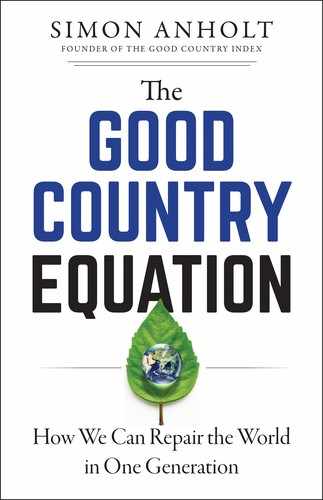![]()
Notes
Chapter 3
1. Simon Anholt, Competitive Identity (London: Palgrave Macmillan, 2007).
Chapter 4
2. Adam Smith, The Theory of Moral Sentiments (London: Andrew Millar, 1759).
3. Joseph Nye, Soft Power: The Means to Success in World Politics (New York: Public Affairs, 2004).
4. Oliver Sacks, The Man Who Mistook His Wife for a Hat (New York: Harper & Row, 1985), 82.
Chapter 5
5. Hergé, Tintin au Tibet (Brussels: Casterman, 1960).
6. Simon Anholt, Brand New Justice, 2nd ed. (Oxford: Elsevier, 2005).
7. World Bank Group, Botswana: Country Brief, accessed December 30, 2019, https://go.worldbank.org/M3CUWG35P0.
Chapter 6
8. Simon Anholt, “Which Country Does the Most Good for the World?” a talk presented at TEDSalon Berlin, June 2014, 17:15, accessed December 30, 2019, http://www.ted.com/talks/2036.
Chapter 7
9. Henri Bergson, Le rire: Essai sur la signification du comique (Paris: Éditions Alcan, 1924).
10. Michael Buckley, ed., Shangri-La: A Travel Guide to the Himalayan Dream (Chesham: Bradt Travel Guides, 2008).
Chapter 8
11. For example, Haldór Laxness, Sjálfstætt fólk (New York: Vintage Books, 1934).
Chapter 9
12. Carl Sagan, Pale Blue Dot: A Vision of the Human Future in Space (New York: Random House, 1994).
13. Gerard Manley Hopkins, “Pied Beauty” in Poems of Gerard Manley Hopkins, ed. Robert Bridges (Oxford: Oxford University Press, 1918).
Chapter 10
14. Richard G. Wilkinson and Kate Pickett, The Spirit Level: Why More Equal Societies Almost Always Do Better (London: Allen Lane, 2009).
15. Edward de Bono, Lateral Thinking (London: Penguin, 1970).
16. Voltaire, Candide, ou l’Optimisme (Geneva: Cramer, 1759).
Chapter 11
17. Augusto Rupérez Micola et al., “TV or Not TV? The Impact of Subtitling on English Skills,” Journal of Economic Behavior and Organization, 158(c) (2018): 487–99.
Chapter 12
18. Quoted in Francis Henry Taylor, The Taste of Angels: A History of Art Collecting from Rameses to Napoleon (Boston: Little, Brown, 1948), 65–66.
Chapter 13
19. The Human Safety Net, https://www.thehumansafetynet.org/.
20. Geert Hofstede, Culture’s Consequences: International Differences in Work-Related Values (Newbury Park, CA: Sage Publications, 1980).
Chapter 15
21. Freedom House, https://freedomhouse.org/report/freedom-world/2018/kazakhstan.
22. Hassan Damluji, The Responsible Globalist: What Citizens of the World Can Learn from Nationalism (London: Penguin, 2019).
Chapter 16
23. See Adam M. Brandenburger and Barry J. Nalebuff, Co-opetition: A Revolution Mindset That Combines Competition and Cooperation (New York: Crown Business, 1996).
24. Robert Govers, Imaginative Communities: Admired Cities, Regions and Countries (Antwerp: Robert Govers, 2018).
Chapter 17
25. World Values Survey, accessed December 30, 2019, http://www.worldvaluessurvey.org/wvs.jsp.
26. R. O. Ekechukwu and Chimela F. Nwineke, “Relationship between Openness to Experience, Conscientiousness and Optimism in Students’ Academic Work among Senior Secondary School Students in University Demonstration Secondary School UDSS-Uniport Rivers State,” European Journal of Education Studies 2, no. 2 (2016), 134.
27. “Saviour Chishimba: Global Vote Winner,” candidate profile, Zambian presidential election 2016, The Good Country, accessed December 30, 2019, https://www.goodcountry.org/global-vote/elections/zambia/candidates/saviour-chishimba.
Chapter 18
28. United Nations Sustainable Development Goals, https://www.un.org/sustainabledevelopment/sustainable-development-goals/.
29. Yale Program on Climate Change Communication, https://climatecommunication.yale.edu/visualizations-data/cancun-presentation-climate-change-in-the-public-mind/.
